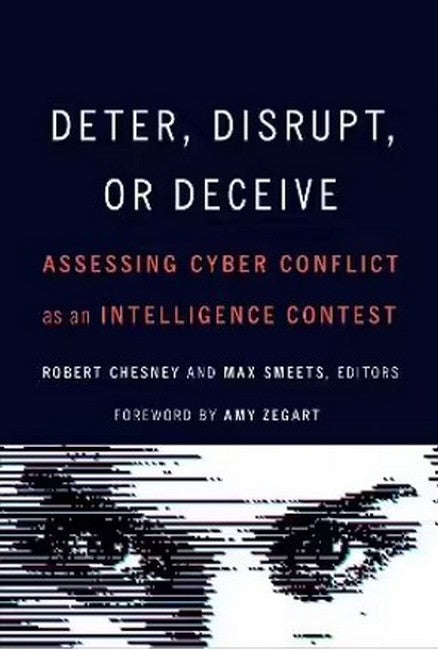Robert Chesney is the Dean of the University of Texas School of Law, where he also holds the James A. Baker III Chair in the Rule of Law and World Affairs. He is also a co-founder of and contributor to the blog Lawfare and co-host of the National Security Law Podcast.
Max Smeets is a senior researcher at the Center for Security Studies at ETH Zurich and Director of the European Cyber Conflict Research Initiative.
Request Academic Copy
Please copy the ISBN for submitting review copy form
Description
Foreword
Amy Zegart
Preface
Robert Chesney and Max Smeets
Introduction
Robert Chesney and Max Smeets
Part I: A Theoretical Debate
1. The Elements of an Intelligence Contest
Joshua Rovner
2. The Character of Strategic Cyberspace Competition and the Role of Ideology
Michael Warner
3. Hidden Dangers in the American Military Solution to a Large-Scale Intelligence Problem
Jon R. Lindsay
4. Secrecy in Strategy
Lennart Maschmeyer
5. Cyber Persistence, Intelligence Contests, and Strategic Competition
Michael Fischerkeller & Richard Harknett
6. The United States and Legitimizing Rules of the Game
Steven Loleski
Part II: Country Case Studies
7. A Chinese Perspective on the New Intelligence Framework to Understand National Competition in Cyberspace
Lyu Jinghua
8. Russia’s Holistic Conceptual Framework for Cyber Activity
Valeriy Akimenko and Keir Giles
9. The Development of United Kingdom’s Cyber Posture
Ciaran Martin
Part III: Nonstate Actors
10. Private Actors and the Intelligence Contest in Cyber Conflict
JD Work
11. Taking Non-State Actors Seriously (No, Seriously)
Nina A. Kollars
Conclusion
Robert Chesney and Max Smeets
Notes
Index
List of Contributors
"This unique volume offers compelling explanations of activities in the cyber domain, behavior that seems anomalous when viewed from well-known perspectives of war, deterrence, and intelligence. Deter, Disrupt, or Deceive provides a new look at the nature of cyberspace and how the physical (virtual?) aspects of this domain shape the nature of conflict within it."—James J. Wirtz, professor, department of national security affairs, Naval Postgraduate School
"Fusing theoretical sophistication with empirical richness, this volume greatly enhances our understanding of cyber conflict. It dissects the relationship between intelligence and cyber operations, challenging assumptions and offering alternative analytical frameworks. In the best intellectual tradition, this is a mature conversation between genuine experts in their fields. Essential."—Tim Stevens, reader in International Security, Kings College London

